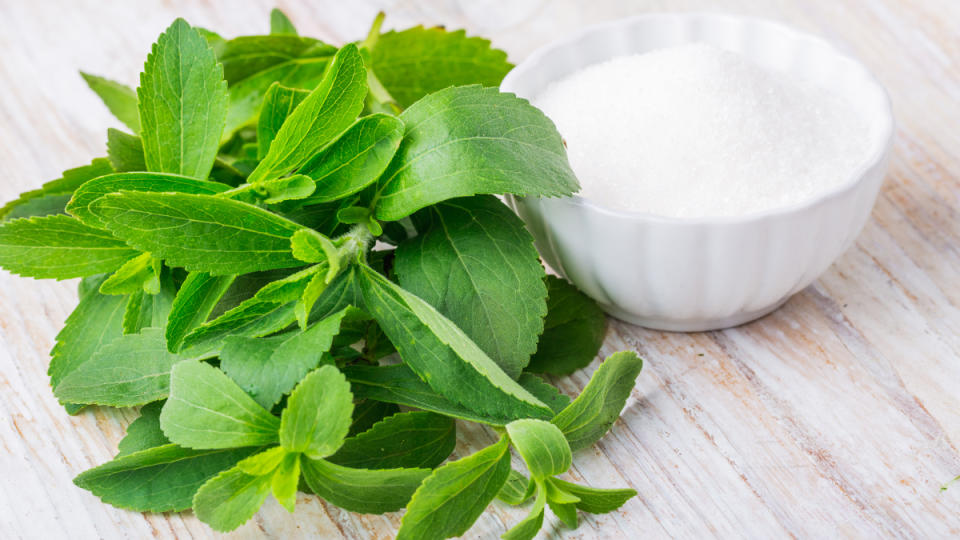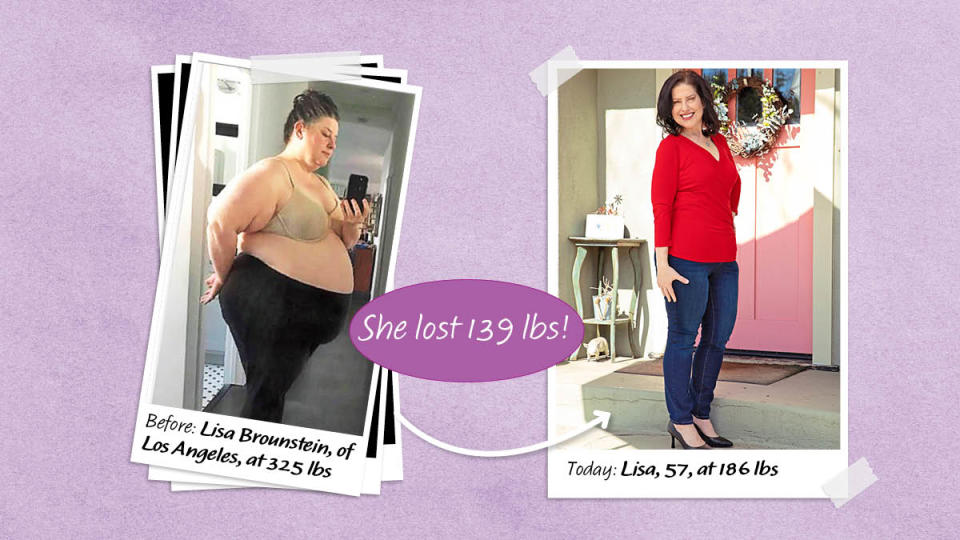Which Sweetener Is Best for Weight Loss? Doctors Weigh In
Savvy food scientists and globe-trotting health explorers are always on the lookout for the next best sugar substitute, whether found in nature or formulated in a lab. That means we’ve never had more choices to sweeten our favorite drinks and desserts — without adding hundreds of calories. But in this fast-moving field of nutrition science it’s hard to know what sweetener is best. So we scoured the research and talked to health experts about two common natural sugar substitutes: allulose vs stevia. Keep reading to get all the info you need to enjoy eating sweets without wreaking havoc on your health and waistline.
Why sugar substitutes get a bad rap
Historically, dieters turned to sugar alternatives to keep calories down in an effort to do something good for their health. But it’s been well documented that artificial low-calorie or no-calorie sweeteners (such as saccharin, aspartame and sucralose) may not be the healthiest substitutes for real sugar.
“I see patients who suffer from fatigue and symptoms due to sucralose sensitivity every week,” says Mark Menolascino, MD, director of the Meno Clinic in Wilson, Wyoming. Millions of women use the low-cal sweetener, sold as Splenda, instead of sugar. “But it’s made by treating sugar molecules with chlorine which produces compounds that are foreign to the body,” he explains. The result: Women who are sensitive to it struggle with fatigue, headaches, body aches, digestive problems, and more. And research suggests that sucralose can have toxic effects on the liver and gut, sapping energy even more, says Ann Louise Gittleman, PhD. She estimates that 60 percent of women suffer but go undiagnosed.
Related: Can Sucralose Cause Joint Pain? Yes — How One Woman Cured That and More By Cutting the Sweetener Out
Indeed, in a review of 37 studies undertaken in 2017, researchers from Canada found that intake of sucralose and aspartame were linked with an increased risk of weight gain and obesity, along other many other health problems. And many of us remember when aspartame caused a stir years ago when it was linked to cancer in lab rats.
More recently, a Cleveland Clinic team uncovered that the sweetener erythritol is linked to a higher risk of stroke and heart attack. Plus, sucralose (often called Splenda) has been shown to trigger changes in the gut microbiome that are believed to fuel weight gain. In another not-yet-published study, sucralose and acesulfame K (which is similar to aspartame) were linked to disruptions in blood-sugar regulation after just two weeks of use.
Related: New Study Links Erythritol to Blood Clots —Nutrition Pros on What You Need to Know
“Artificial sweeteners put into products to supposedly make them ‘healthier’ pave the way for diabetes,” asserts Fred Pescatore, MD, who admits he drank soda with “anti-nutrient” fake sugars when he was 80 pounds heavier as a teen. He adds, “Artificial sweeteners put our body’s blood-sugar control into a tailspin.”
Yet not all sugar substitutes have a black cloud over them. Keep reading to learn more about allulose and stevia, plus three women with sweetener diet success stories.
What sets allulose apart
Allulose is the newest sweetener in town. It is a naturally occurring simple sugar that's classified as a “rare sugar” since it’s found in small amounts in nature in foods such as dried figs, raisins and maple syrup. Nutrition expert JJ Virgin calls it “the new wonder sweetener.”
And biochemist Dee McCaffrey, author of The Science of Skinny and host of the podcast “Diet Science,” says, “Researchers are calling allulose a ‘dream sugar’ and the holy grail of natural sweeteners.”
Unlike some other sugar substitutes, allulose is considered very safe. In fact, experts praise allulose for the many ways it is known to enhance health and support weight loss goals.
The FDA declared that allulose “is different from other sugars in that it is not metabolized by the human body in the same way as table sugar.” That means it tastes sweet without making blood sugar levels spike. Weight-loss expert David Perlmutter, MD, adds, “Allulose is the only natural sugar in America that has received this designation.”
6 health benefits of allulose
Here’s just a few ways all-natural allulose promotes health by impacting several metabolic factors in the body. And keep reading see how one woman lost more than 100 pounds by incorporating allulose into her healthy diet routine.
1. Allulose delays carb absorption
What that means: When you eat a high-carb meal, like pancakes made with allulose, your blood-sugar level in the short-term will be lower than it would be if you made the pancakes with sugar or several other natural sweeteners. This move helps protect the pancreas from damage that can lead to diabetes.
2. Allulose helps the liver work better
Allulose allows more blood sugar to be pulled out of the bloodstream so the liver can convert it into a more valuable form of future energy. This change improves metabolism and long-term blood-sugar management, as measured through A1C readings (a measure of blood-sugar levels over a three-month period of time). Just ask Celest Wehmeier, 63, who lost 75 pounds after using allulose while following the Dirty Lazy Keto diet. “Allulose was very important to my journey,” she says of dropping her A1C from a diabetes-level 8.0 to a healthy 5.3.
3. Allulose dials down cravings and helps you you feel fuller longer
Allulose increases satiety by releasing appetite-suppressing GLP-1 hormones — the same ones weight-loss drugs like Ozempic suppress. Australian research finds that other artificial sweeteners reduce these helpful hormones by 35%, but allulose is proven to boost levels of these protective hormones by 70% in 1 hour. (Click through for more natural GLP-1 alternatives.)
4. Allulose prevents blood-sugar spikes
Managing our blood sugar can be tricky with a standard American diet, rich in carbs. But allulose helps. Dr. Pescatore adds, “Anytime we regulate blood sugar better, we decrease the risk of heart disease, cancers—especially breast cancer—diabetes and obesity.”
Related: Four Glucose Goddess Hacks to Lower Blood Sugar
5. Allulose can speed weight loss
A study in the journal Nutrients showed that adults consuming allulose shed more weight than those using sucralose. In fact, people eating allulose (and making no other diet changes) burned 1,134% more belly fat than those using Splenda. Just ask dieter and baker Holly Harz: She lost 1 pound a day enjoying healthy, homemade treats baked with allulose.
6. Allulose can help you transition off Rx diet drugs
Regaining weight is a common concern after using prescription weight-loss drugs. So Dr. Pescatore recommends allulose to women coming off Ozempic. “I have a bunch of patients on allulose and they love it,” he says. “I’m not really having a difficult time keeping people’s weight off these days using tools like allulose.” (Click to read more about whether Ozempic is right for you.)
What about Stevia?

Unlike allulose, stevia is not a sugar. But stevia is all-natural. The zero-calorie sweetener and sugar substitute is derived from the leaves of the plant species Stevia rebaudiana, also known as sweetleaf, that is native to Brazil and Paraguay. The active compounds of stevia are steviol glycosides, which have up to 150 times the sweetness of sugar. And while allulose is nearly calorie-free, stevia is 100% calorie free and carb free. “The herb stevia is not only great for weight loss, it’s also been shown to improve insulin sensitivity in diabetics,” adds Dr. Josh Axe, DC, DNM.
Stevia has been around longer than allulose so it has the name recognition of a familiar, trusted product. McCaffrey says liquid stevia is her go-to sweetener these days, although she occasionally experiments with allulose to maintain her 100-pound weight loss. But like some other sweeteners, stevia can cause bloat or digestive upset in some users.
Dieters often tell us they dislike the overly sweet aftertaste of stevia, for example when adding it to a cup of tea or lemonade. Turns out, compounds in stevia known as rebaudiosides cause the lingering sweetness. Nutrition experts Mira Calton, CN, and Jayson Calton, PhD, authors of The Micronutrient Miracle, suggest this fix: Add a tiny pinch of sea salt to your drink. The American Chemical Society conducted research and found that adding a bit of salt reduced the sweet aftertaste left by some artificial sweeteners, including stevia, by as much as 79%. "Just keep in mind that regular table salt won’t work since it doesn’t contain these aftertaste-dampening minerals," they say. "If you want to bake with stevia, add an extra splash of vanilla extract or other natural flavor to mask any aftertaste."
Allulose vs. stevia: Which to choose?
Experts agree that both of these sweeteners are natural and safe to use. But one key difference is how allulose and stevia work in the body. If you're looking to lose weight, allulose may be your best bet. Dr. Pescatore explains: “Stevia has none of the potential GLP-1 hunger-hormone benefits that allulose has, so allulose may have an edge with weight loss.” As mentioned earlier, consuming allulose has been shown to boost this hormone in the gut responsible for taming hunger by 70%. Stevia can’t do that.
What stevia can do: regulate blood sugar. "Stevia has been shown to improve insulin sensitivity in diabetics,” says Dr. Axe. One study found that participants’ blood-glucose levels were lower a mere 20 minutes after eating stevia-sweetened food. Other research shows that stevia reduces glucose levels by up to 35%.
Whichever healthy sweetener you choose to use, Dr. Pescatore says, “Either is better than regular refined sugar or artificial sugar substitutes for your body.”
How to get allulose into your diet
To give allulose a try, swapping it for regular sugar or health-harming chemical sugar substitutes in your diet. Dr, Pescatore says, “Allulose can be easily slipped into what you’re already eating, without thinking twice, to get the health benefits.”
According to the nonprofit organization The Calorie Council, allulose looks, bakes and tastes like real sugar. And although it has 90% fewer calories than regular sugar, it doesn’t have an artificial aftertaste like other substitutes.
Research shows health and weight-loss benefits can start with just 2 tsp. of allulose daily, and Dr. Pescatore says you can have as much as 6 tsp. per day. JJ Virgin assures, “Unlike some sugars, allulose resists fermentation in the gut so you shouldn’t get gassy and suffer changes with your GI system.”
1. Experiment with different varieties
This sweetener comes in three easy-to-use forms. For a honey-like liquid variety, try stirring Wholesome Yum Liquid Allulose (Buy on Amazon, $14.99 for 11 oz.) into tea or coffee. Or there’s Wholesome Yum Powdered Allulose for delicate frosting, mousse or smoothie recipes (Buy on Amazon, $14.99 for 1 lb.). And, of course, there’s granulated allulose for cake or cookie recipes. Consider Whole Earth (buy on Amazon, $7.59 for 12 oz.)
2. Determine the right amount for you
Allulose is less sweet than traditional sugar, so the ideal recipe conversion is 1 cup of granulated sugar to 11?3 cups of granulated allulose. Or if you like a muted sweetness, use a 1:1 ratio. Allulose also browns quickly, so use a slightly lower oven temperature for baking.
3. Try these ready-made treats that contain allulose
While many grocery store snacks are still packed with health-harming chemical sugars, you can find all-natural allulose in a growing number of brands. Here, four faves from our team of taste testers:
Chobani Zero Sugar Yogurt (available at grocery stores)
Quest Hero Protein Bars, like the chocolate caramel pecan flavor (Buy on Amazon, $21.84 for 12)
Good Measure Bars, like the creamy peanut butter & dark chocolate variety (Buy on Amazon, $19.99 for 12)
Liquid IV Flavor Sticks (Buy on Amazon, $26 for 10). Click through to learn how Liquid IV electolytes help you lose weight)
4. Check out these sweet recipes that contain allulose

Personal pumpkin pies, from Stephanie Laska, founder of Dirty Lazy Keto
Cinnamon rolls from keto nutritionist Maria Emmerich, the best-selling author of Secrets to a Healthy Metabolism
Allulose success story: Lisa Brounstein, 57

Heartbroken after losing her best friend “to the ravages of diabetes,” Lisa Brounstein, 57, knew she didn’t want to meet a similar fate. She’d already been diagnosed with Type 2 diabetes herself. And she figured she only had two options: I could either be deprived of my life or deprived of yummy foods.
Yet, along her weight-loss journey, Lisa discovered an exciting third option: eating delicious foods that actually helped her weight and blood sugar. “It was a hard lesson,” she says of eating low-carb but feeling frustrated to find that many foods labeled “keto” or “sugar-free” still contained artificial sugars that sent her blood sugar soaring.
Then Lisa discovered allulose. “It didn’t raise my blood sugar.” With the help of this natural sweetener, Lisa enjoyed healthier versions of bread and chocolate cookies. “Allulose kept me from having cravings and allowed me to have the best ice cream ever,” she recalls. “And it was magic in iced tea.”
This tool guided Lisa through the tail end of an amazing transformation, where she got off all her prescription medications except one, improved her asthma and erased her sleep apnea. Her triglycerides dropped from 208 to 60. She also halted her full-blown Type 2 diabetes with diet, exercise and lifestyle changes. In amazement, she watched her A1C fall from 6 to 4.8 and her blood sugar improve by over 115 points.
Now, Lisa inspires people on Instagram @yet_another_fork_in_the_road. “All this happened during menopause, so it’s possible to lose weight!”
Lisa’s recipe for allulose-sweetened ‘nice’ cream
Combine 1 Fairlife Nutrition Plan shake (like vanilla or chocolate, with 2 grams sugar (Buy on Amazon, $38 for 8 shakes), 1 Tbs. allulose, 1 Tbs. golden monk fruit like Lakanto (Buy on Amazon, $7.24 for 8 oz), 1 tsp. salt and 2 Tbs. cream cheese. Add strawberries, blueberries or bananas, if desired. Blend with an immersion blender and freeze for 24 hours. Thaw to enjoy or re-spin the frozen mixture in a Ninja Creami countertop appliance.
This content is not a substitute for professional medical advice or diagnosis. Always consult your physician before pursuing any treatment plan.
For more on natural sweeteners, keep reading:
Lucuma Is The Maple-Caramel Superfood Of Our Dreams — And It’s Great for Diabetics!
3 Natural Sweeteners to Try If You Have High Cholesterol, Diabetes or Catch Colds Easily
